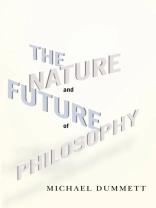Philosophy is a discipline that makes no observations, conducts no experiments, and needs no input from experience. It is an armchair subject, requiring only thought. Yet that thought can advance knowledge in unexpected directions, not only through the discovery of new facts but also through the enhancement of what we already know. Philosophy can clarify our vision of the world and provide exciting ways to interpret it.
Of course, philosophy’s unified purpose hasn’t kept the discipline from splintering into warring camps. Departments all over the world are divided among analytical and continental schools, Heidegger, Hegel, and other major thinkers, challenging the growth of the discipline and obscuring its relevance and intent. Having spent decades teaching in American, Asian, African, and European universities, Michael Dummett has felt firsthand the fractured state of contemporary practice and the urgent need for reconciliation. Setting forth a proposal for renewal and reengagement, Dummett begins with the nature of philosophical inquiry as it has developed for centuries, especially its exceptional openness and perspective-which has, ironically, led to our present crisis. He discusses philosophy in relation to science, religion, morality, language, and meaning and recommends avenues for healing around a renewed investigation of mind, language, and thought. Employing his trademark frankness and accessibility, Dummett asks philosophers to resolve theoretical difference and reclaim the vital work of their practice.
Mục lục
1. Philosophy as an Academic Subject
2. What Is a Philosophical Question?
3. Philosophy as the Grammar of Thought
4. Science
5. Psychology and Scientism
6. Religion and Philosophy
7. Religion and Morality
8. The Influence of Gottlob Frege
9. Frege’s Analysis of Sentences
10. Frege’s Theory of Meaning
11. Gadamer on Language
12. The Paradox of Analysis
13. Thought and Language
14. Realism
15. Relativism
16. The Future of Philosophy
Giới thiệu về tác giả
Michael Dummett was Wykeham Professor of Logic at Oxford University until his retirement in 1992. He has taught at Stanford University, Princeton University, the University of Bologna, the University of Ghana, and Harvard University, and is the author of numerous volumes, including
Truth and the Past,
The Seas of Language, and
Origins of Analytical Philosophy.












